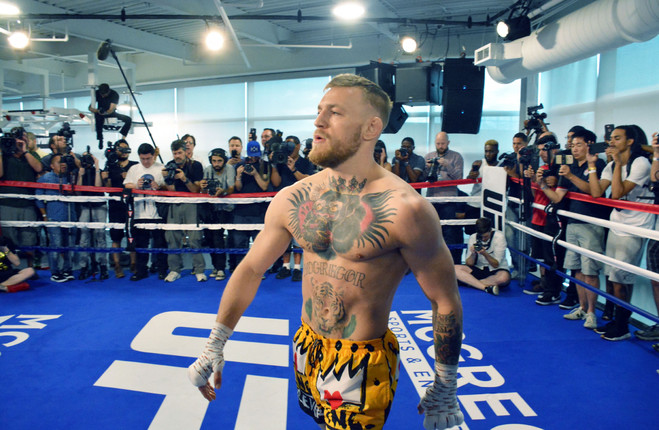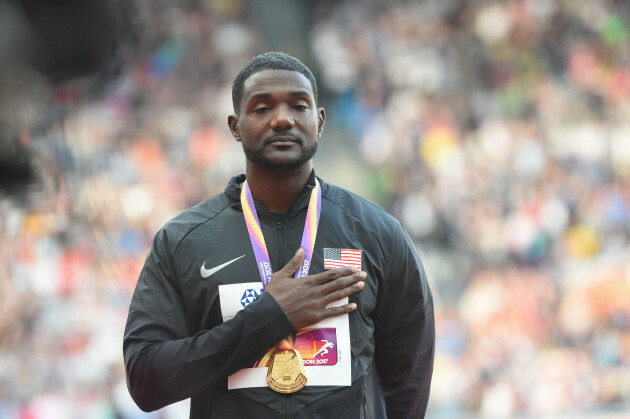1. SIXTY-EIGHT DAYS before the fight in Las Vegas, McGregor walked into his new Dublin gym for the first time. Kavanagh looked forward to showing him the mural. The Subset guys waited around the ring for his reaction too. When McGregor saw people he didn’t recognize, his metabolism changed. He took a few steps toward the artists. He asked again who the guys were, and Kavanagh told him to walk a little farther into the room and look at the wall. Kavanagh could only shake his head. The Subset founder, who never lets his name appear in public as a strange kind of street cred affectation, could sense the danger. “I’d never been in someone’s company before who was purely male energy,” he says. “There was no female energy. And not in a macho way. He wasn’t fronting up. He’s running off this raw, food chain, evolution, strongest-survive energy. He’s cold. That’s what he’s like. He was open, a gentleman, but he’s cold at the base of it.
Wright Thompson’s ESPN feature on Conor McGregor and where the Irish fighter grew up has got people talking. The piece contains some fascinating insights into the MMA-star-turned-boxer’s mindset along with the occasional controversial assertion about Dublin. The article has proved divisive since publication — read it here and find out what all the fuss is about.
2. This was new.
Cameron Worrell, then a 27-year-old Miami Dolphins safety, was sitting in meetings, listening to his coaches detail the Patriots offense. It was October 2007.
“It’s crazy because now it’s hard to imagine a time when this stuff wasn’t everywhere,” Worrell said. “The coaches were saying, ‘They’ll be using three or four receivers, using guys in the slot, they’ll be quick at the line, they may not huddle, they’ll be in shotgun.’ And you’re thinking, ‘Whoa, this is totally different.’ But all this one-on-one matchup stuff—that’s all the NFL is now.”
Sunday came, and he was shuffling backward, trying to stop the best offense in NFL history. You hear that the steam engine was invented, but you can’t grasp that fact until one is barreling toward you.
Everything about the offense seemed different. Randy Moss had changed. When Worrell faced him in Minnesota, Moss would come streaking down the field after plays he wasn’t involved in, shouting, “If Daunte had thrown to me there, I would have dunked on you.” But now, that chatter had been replaced by something far more intimidating: silence. “He wasn’t talking because he knew how good they were,” Worrell said, “and they were just going to go do it.”
10 years on, The Ringer assess the legacy of the 2007 New England Patriots.
3. Eight years ago, on a hot summer’s day, I sat down with Lindsay Peat outside Anderson’s Creperie in Drumondra. We did our best to ignore the smell of the sweet pancakes and melted chocolate as we sipped black coffees in the sunshine. Peat was preparing for an All-Ireland football final against Cork so treats were off limits.
We talked about how professional training and preparation had become and the differences between her first love, basketball, and her new love, Gaelic football. She was polite and entertaining but clearly a little nervous as interviews were not commonplace.
At that stage in her life she was in her late 20s, she was a basketball international and a year away from winning an All-Ireland football title with Dublin.
But she hadn’t yet entertained the thought of picking up a rugby ball. She wasn’t married and her son Barra hadn’t come along. It was a different time and Peat was, in ways, a very different person.
Writing for the Irish Independent, Marie Crowe profiles multi-talented Irish rugby international Lindsay Peat.
4. Did you hear what Michael Jordan said about LeBron James? What Dennis Rodman said about the current Golden State Warriors versus the “Run TMC” version? What Mike Schmidt said about Odúbel Herrera, home runs, and pretty much everything?
I’m guessing you did, either as it flicked across your Twitter feed or germinated into an Undisputed segment. This is sportswriting’s version of the old-timers’ game: asking a former ballplayer what he thinks of the current state of the game and then feigning shock when he says, “Get off my infield grass!” There is no more eternal, and usually lousier, form of sportswriting.
You can sort an old ballplayer’s gripes into four categories. The first is: “The new guy isn’t even good.” In 1939, Tris Speaker, a Baseball Hall of Famer whose career began in 1907, was asked if Joe DiMaggio was a worthy heir. “Him?” Speaker replied. “I could name 15 better outfielders!
Bryan Curtis on former athletes’ tendency to always complain about modern-day players.
5. Still, to hear the boos ring out around the London Stadium as Gatlin won was to be reminded of how lucky we are that British athletes don’t cheat. Historically, this sceptred isle has been a place where athletes can get really good as they approach their mid-30s – a place where even people suffering from asthma or other performance unenhancing ailments can, with the right medication, realise their potential as champions.
‘Britain is fine booing Justin Gatlin, but what about closer to home?’ asks Marina Hyde of The Guardian.
6. Finn has never played organised sport, an admission that makes him something of a rarity in an American town where most children start lacrosse or soccer or baseball (and sometimes all of the above) at three and four. Neither has he ever evinced any interest in swinging a bat or taking a shot even as he traipsed after his athletic older brothers. Until now. A few weeks back, pottering around his grandparents’ garage, a suburban museum teeming with so many relics of 70s and 80s’ childhoods, he picked up a faded blue and white basketball. And everything changed in an instant.
Dave Hannigan of The Irish Times on his son’s newfound love of basketball and the true spirit of sport.
7. John Jones III was born in Oakland to members of the Black Panthers at a time of division and strife in America. But he remembers the Raiders’ glory days in the NFL with fondness. “I grew up in church, which is segregated. [But being a Raiders fan] was transformative and beautiful in a way that stays with me. It was, and still is, a time of racial disparity and a lot of institutions are set up to divide people. But never the Raiders … I’ve never been a part of another entity that was as inclusive. Didn’t matter your age, economic status, or race. For three glorious hours, we’re family.
The Guardian’s Jose Fermoso says the Raiders helped unite the divisions in Oakland and asks: ‘What happens when they leave?’
8. Every sports star fits the age in which they flourish. Nowhere was this point more obviously made than when Conor McGregor and Floyd Mayweather embarked on their four-city press conference tour to sell their forthcoming ‘fight’.
There is no need here to rehearse the crudity, homophobia, and misogyny – not to mention the suggestions of racism – that was on view. None of that really surprised.
What the repeated press conferences did more than anything else, of course, was reveal the limitations of the famed wit and humour that was supposed to run through it all.
If ever two men deserved each other, they are McGregor and Mayweather.
Nonetheless, to contrast this festival of boors with previous attempts to make money from fighting is not to claim some sort of superiority for the past. There is no truth in nostalgia.
There are resonances of McGregor in the story of a previous Irishman – Jack Doyle – who made his fighting fortune from London and America, but those resonances have been crassly distorted in the echo chamber of the modern media.
Conor McGregor is far from the first Irish fighter to make waves in America, as The Irish Examiner’s Paul Rouse points out.
Subscribe to The42 podcasts here:


